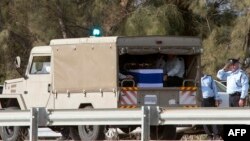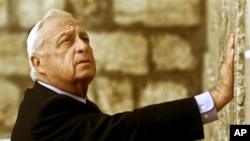JERUSALEM —
Israel's former Prime Minister Ariel Sharon has been buried at his home in the Negev before family, friends and a delegation of visiting dignitaries, following civilian and military services.
He was praised earlier in the day during a memorial service at the Knesset - the Israeli parliament - by Israeli and foreign dignitaries.
Israel's president, Shimon Peres, called him an exceptional soldier who knew how to win.
Peres said rest, great leader, who did not allow himself to rest when serving his people, defending his country and making its fields blossom.
Prime Minister Benjamin Netanyahu said although he and Sharon did not always agree when in government together they cooperated for the security and economy of the country.
He added that Sharon was a practical and pragmatic man whose pragmatism was full of deep feelings for his country and the Jewish people.
Sharon died Saturday at the age of 85. He had been in a coma for eight years after suffering a stroke while prime minister.
A veteran of four Arab-Israeli wars from 1948 to 1973, he was an independent commander who entered politics after his military career ended.
He was revered by some Israelis and criticized by others. He was generally condemned by Palestinians for his tough military tactics and offensives in which hundreds of Palestinians were killed.
U.S. Vice President Joe Biden said like all real leaders Sharon had a north star that guided him.
"His north star was the survival of the state of Israel and the Jewish people wherever they resided," he said.
Britain's former Prime Minister Tony Blair agreed, saying Sharon never wavered from this strategic objective.
"The state which from the age of 14 he fought to bring into being had to be protected for future generations. When that meant fighting, he fought. When that meant making peace, he sought peace. And the same iron determination he took to the field of war, he took to the chamber of diplomacy," said Blair.
Security was tightened in southern Israel prior to Sharon's burial at his ranch some 10 kilometers east of the Gaza Strip. The anti-rocket defense system, called Iron Dome, was deployed in the area amid reports of rocket firing.
Sharon, while prime minister in 2005, ordered an Israeli military operation in Gaza in which more than 1,000 Palestinians and 13 Israelis were killed.
He subsequently ordered the unilateral withdrawal of Israeli soldiers and settlers from Gaza.
A long-time member of the conservative Likud party, he broke away to form the centrist Kadima party the same year. He called elections for March 2006 but suffered the stroke two months before they were held.
He was praised earlier in the day during a memorial service at the Knesset - the Israeli parliament - by Israeli and foreign dignitaries.
Israel's president, Shimon Peres, called him an exceptional soldier who knew how to win.
Peres said rest, great leader, who did not allow himself to rest when serving his people, defending his country and making its fields blossom.
Prime Minister Benjamin Netanyahu said although he and Sharon did not always agree when in government together they cooperated for the security and economy of the country.
He added that Sharon was a practical and pragmatic man whose pragmatism was full of deep feelings for his country and the Jewish people.
Sharon died Saturday at the age of 85. He had been in a coma for eight years after suffering a stroke while prime minister.
A veteran of four Arab-Israeli wars from 1948 to 1973, he was an independent commander who entered politics after his military career ended.
He was revered by some Israelis and criticized by others. He was generally condemned by Palestinians for his tough military tactics and offensives in which hundreds of Palestinians were killed.
U.S. Vice President Joe Biden said like all real leaders Sharon had a north star that guided him.
"His north star was the survival of the state of Israel and the Jewish people wherever they resided," he said.
Ariel Sharon Bio Box
Ariel Sharon- Born in 1928 in farming community north of Tel Aviv
- Joined underground Jewish military organization Haganah in 1942
- Fought as platoon commander in Arab-Israeli war of 1948-49
- Led Commando Unit 101 that carries out reprisal raids in 1953
- Led paratroopers in the 1956 Suez War
- Elected member of parliament in 1973
- Served as security advisor to then prime minister Yitzhak Rabin
- Appointed defense minister in 1981
- Led Israel's 1982 invasion of Lebanon, resigns after being found responsible for failing to prevent massacres in Palestinian refugee camps
- Appointed minister of housing and construction in 1990
- Appointed foreign minister in 1997
- Elected prime minister in 2001, one year after controversial visit to the Temple Mount
- Directed the withdrawal of Israeli troops and settlers from Gaza in 2005
- Established the Kadima party in 2005, new elections set for March 2006
- Has been in a coma since a massive stroke on Jan. 4, 2006
"The state which from the age of 14 he fought to bring into being had to be protected for future generations. When that meant fighting, he fought. When that meant making peace, he sought peace. And the same iron determination he took to the field of war, he took to the chamber of diplomacy," said Blair.
Security was tightened in southern Israel prior to Sharon's burial at his ranch some 10 kilometers east of the Gaza Strip. The anti-rocket defense system, called Iron Dome, was deployed in the area amid reports of rocket firing.
Sharon, while prime minister in 2005, ordered an Israeli military operation in Gaza in which more than 1,000 Palestinians and 13 Israelis were killed.
He subsequently ordered the unilateral withdrawal of Israeli soldiers and settlers from Gaza.
A long-time member of the conservative Likud party, he broke away to form the centrist Kadima party the same year. He called elections for March 2006 but suffered the stroke two months before they were held.






